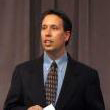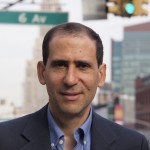The loss of Seattle’s professional basketball team, the SuperSonics, has left a number of their prior fans in a funk that has not receded in time. They did not follow the Sonics when they relocated to Oklahoma City in 2008 and miss having what was once their home team.

Nick Licata, Seattle City Council member
In Seattle, I supported Initiative 91, which said that the public would only invest in another sports arena if they received a fair rate of return.
There is some debate now about whether the current proposal for a new basketball arena, dependent on a $200 million city loan, meets that initiative’s objective. There has been a lawsuit filed and the court will decide.
The proposed deal may be constructed to meet its legal requirement, but I do not believe it meets its intent. In light of the negative impact that the proposed location may have on our manufacturing and marine industry, I was one of two votes against the arena deal.
Aside from the economic benefits an arena or stadium may provide is the joy it brings to many people who strongly identify with a local team. Sports do bring people together and make for another social tie that strengthens the overall urban community. For that reason I believe some public investment can be rationalized, although I do not believe the correct balance was reached in the current proposal.
The debate in Seattle has always been one of “should the public subsidize such ventures and if so, how much?” The answer depends on what the public gains from their investment. And that has come down to measuring benefits in both dollars and in the almost incalculable resulting cultural or social value.
I once spoke offhandedly to a Sports Illustrated writer and said that studies have shown that the loss of a professional team showed no measurable economic loss to a city. When asked by the reporter about cultural value, in a state of hubris, I said close to zero.
I have since confessed many times over for that stupid remark, but it lives on tongues of sport enthusiasts when pointing out that professional sport teams do contribute to the sense of community and joy people share in a city that has one.
Seattle City Councilmember Nick Licata is currently serving his fourth four-year term. Licata chairs the Council’s Housing, Human Services, Health and Culture Committee and is vice-chair of the Council’s Finance and Budget Committee.








